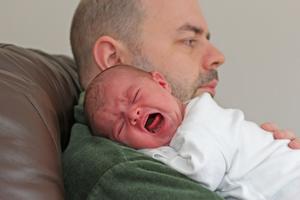e. The Baby's Cries
It is normal for a baby to cry. Crying is the only way a baby can let you know when something is wrong. Loneliness, the need for a diaper change, or to be cuddled can make a baby cry. A baby will cry if he or she is sick, uncomfortable, or if he or she feels alone. Babies may also cry because they are hungry, however, crying is a late sign of hunger. An infant crying from hunger may be too upset to settle down to feed. It is important you get to know your baby's early feeding cues. Please refer to module 4 for more information on infant feeding cues.

Most babies have a fussy period every day, and it is more difficult to comfort them during this time. A six-week old baby cries an average of two to three hours per day. Certain babies cry because they are colicky. They may cry day and night. The crying becomes unbearable, and the parents often become frustrated and angry. You may feel tired, alone, incompetent, disappointed, or desperate.
2. The Baby that Cries Continuously
Certain babies are inconsolable. To hear an infant crying continuously is difficult to handle. Don't hesitate to take a break. If you have the impression that you are going to lose patience, here is what you can do.
If you have the impression that your baby has been crying for hours and that nothing seems to help, you are probably exhausted and angry. No matter how you feel, never shake your baby.
3. Shaken Baby Syndrome
This is what happens when a baby is shaken.
- Your infant will feel pain and will be afraid, which will make it cry even more.
- When you shake your baby, its head will be tossed frontward and backward. The baby is not strong enough to stop the movement.
- Because the baby's head is large compared to the rest if its body, you must support its head when lifting or laying the baby down.
- Your baby's brain is delicate. When a baby is shaken, its brain strikes against the interior of its head which can result in bleeding. Shaking can cause brain damage leading to convulsions, learning disabilities, behavior problems, or even death.
- Babies of less than eleven months are easily injured if shaken. Even older children may be injured. Throwing a baby up in the air or swinging them without supporting the head can also injure the baby.
Talk with everyone involved in the care of your baby such as older children, babysitters, friends, family, or any intervener responsible for taking care of the baby. Tell them to be careful and never to shake your baby. Never leave your baby with someone that has a violent temper or someone you don't know.
If a baby seems to have stopped breathing, call 911. Shaking a baby will not cause it to start breathing but could injure him or her.
 |
ATTENTION ! Never shake your baby. It only takes a few seconds to cause permanent injury. |

